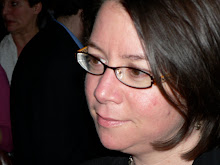and his friends were all at one house (a regular and excellent arrangement), and the parent in charge took the day to teach them all to play. The current phase has been fueled by an afterschool D&D club full of good friends and run by another parent. For those of you who don't know, D&D is a tabletop roleplaying game in which each player is a character in a traveling company, sort of like the Fellowship of the Ring. The leader, who is called the dungeonmaster, creates an imaginary setting (usually medieval), and the characters have adventures in that setting. The action unfolds through collaborative storytelling led by the dungeonmaster, but it is not a free-for-all: the dilemmas, battles, discoveries, and encounters that take place are regulated partly by each character's abilities (Strength, Constitution, Dexterity, Intelligence, Wisdom, and Charisma) and partly by rolls of special many-sided dice, as well as the internal logic of the story. Characters generally get stronger with experience, and players who play for a long time may develop their favorite character for years. Jordan's character is a human fighter named Sinister, nicknamed RangeMaster, who holds a great-sword and an extremely accurate longbow. His character's brother is the character played by his friend Lior, also a marksman, with special training that has earned him infinite arrows.
The quality of a D&D experience is hugely influenced by the talent of the dungeonmaster running it, and Jordan's DM, Ben, is a treasure. From what I hear, his storytelling may as well be performance art, and he is passionate about nurturing the creative spark he sees in the kids. He is also a fiction writer, and passionate about getting the kids to write their stories. Evidently he knows what he's doing, because he is extremely inspiring to Jordan. Our (former??) reluctant writer now assigns himself D&D story-writing homework and asks to write for fun. He sits himself down at the family laptop and puts on the sound-blocking headphones so that he can concentrate. One day a couple weeks ago he had finished all his schoolwork at school and thus spent every spare minute after dinner writing his story. When offered dessert, he said, "No thanks. This is my ice cream." Are you kidding? I almost burst into tears. He did even more writing before breakfast the next day.
Then he got out his D&D Player's Handbook (6th Edition) and demonstrated to me that (1) there is an equal share of female characters represented in the illustrations, (2) they are supercool characters with incredible powers, and (3) they are appropriately dressed for what they are doing. This is apparently something the D&D designers have been working on, which only makes sense for expanding their market. I have to say I am impressed. Here is what the Player's Handbook says about selecting your character's sex:
You can play a male or female character without gaining any special benefits or hindrances.That itself is huge. But it goes on:
Think about how your character does or does not conform to the broader culture's expectations of sex, gender, and sexual behavior. For example, a male drow cleric defies the traditional gender divisions of drow society, which could be a reason for your character to leave that society and come to the surface.
You don't need to be confined to binary notions of sex and gender. The elf god Corellon Larethian is often seen as androgynous or hermaphroditic, for example, and some elves in the multiverse are made in Corellon's image. You could also play a female character who presents herself as a man, a man who feels trapped in a female body, or a bearded female dwarf who hates being mistaken for a male. Likewise, your character's sexual orientation is for you to decide.WHOA. I have to say, I could have used a little more of that gender openness the one time that I tried to play D&D. I had friends in high school who played, and I wanted to try it; the DM sort of tossed me a character sheet, but didn't give me any guidance that I remember. I felt really lost but gave it a go anyway, making up a name and I forget what else for my character. I think the name was Rayna. He took one look and said, "Character with a name like that probably isn't going to make it." I had no idea what was wrong with the name, but I got the message: This game is not for you. Now I think what was wrong with the name is that it was feminine. I bet if I had named my character GrrrThor I would have been included. Fast forward thirty years, and Jordan's D&D club has kickass girls in it; I don't know their character's names, but I know that in the last session one of them blew out a zombie with her flame pack, and in an earlier adventure, another girl solved a puzzle by surfing across a lava lake on her shield. Some things are better than they used to be.


